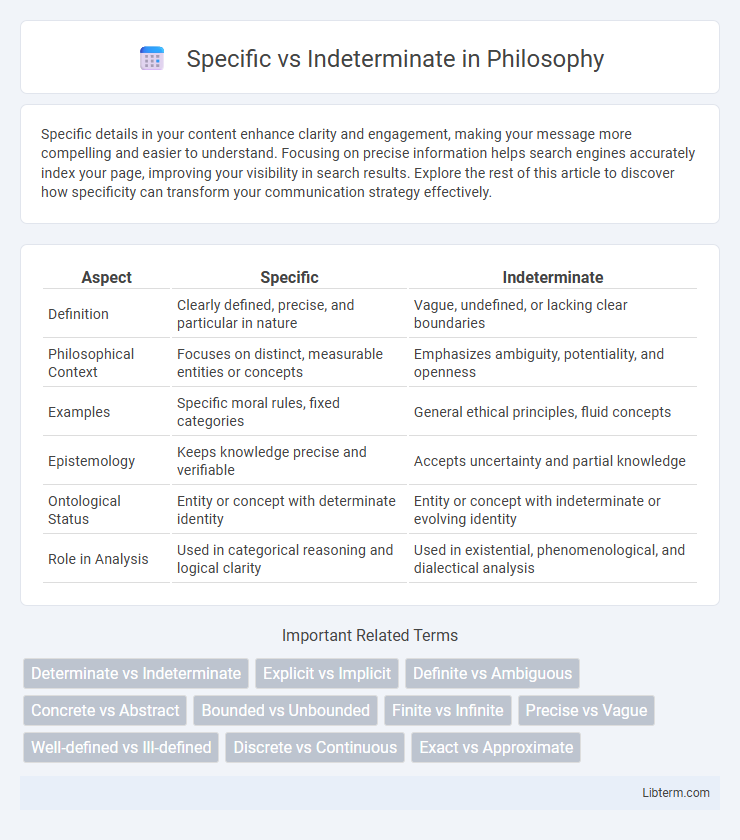Specific details in your content enhance clarity and engagement, making your message more compelling and easier to understand. Focusing on precise information helps search engines accurately index your page, improving your visibility in search results. Explore the rest of this article to discover how specificity can transform your communication strategy effectively.
Table of Comparison
| Aspect | Specific | Indeterminate |
|---|---|---|
| Definition | Clearly defined, precise, and particular in nature | Vague, undefined, or lacking clear boundaries |
| Philosophical Context | Focuses on distinct, measurable entities or concepts | Emphasizes ambiguity, potentiality, and openness |
| Examples | Specific moral rules, fixed categories | General ethical principles, fluid concepts |
| Epistemology | Keeps knowledge precise and verifiable | Accepts uncertainty and partial knowledge |
| Ontological Status | Entity or concept with determinate identity | Entity or concept with indeterminate or evolving identity |
| Role in Analysis | Used in categorical reasoning and logical clarity | Used in existential, phenomenological, and dialectical analysis |
Defining Specific and Indeterminate: Key Differences
Specific refers to clearly identified or particular entities, objects, or individuals, such as "the red car parked outside," which denotes a distinct and known item. Indeterminate describes uncertain or unspecified entities, like "a car parked outside," indicating any car without particular identification. The key difference lies in the precision of identification, where specific entities are definite and countable, while indeterminate entities remain vague and non-specific.
Historical Context: Evolution of Specific vs Indeterminate Concepts
The historical evolution of specific and indeterminate concepts traces back to classical philosophy where Aristotle distinguished between defined categories and vague notions. During the Enlightenment, thinkers like Locke and Kant further refined these ideas, emphasizing clarity and precision in knowledge classification. Modern linguistic and cognitive sciences continue to explore this dichotomy, highlighting its impact on language, reasoning, and decision-making processes.
Importance of Specificity in Modern Analysis
Specificity in modern analysis enhances accuracy by providing clear, measurable parameters that reduce ambiguity and allow for precise data interpretation. Indeterminate factors can obscure results, making the identification of trends and correlations more challenging in scientific, financial, and technological contexts. Emphasizing specificity is crucial for developing reliable models, improving decision-making processes, and advancing research methodologies.
The Value of Indeterminacy in Complex Systems
Indeterminacy in complex systems allows for adaptive flexibility and resilience by enabling multiple potential outcomes in unpredictable environments. This inherent variability supports emergent behavior and innovation, which deterministic models often cannot capture. Embracing indeterminate elements can enhance decision-making processes and foster robust system evolution amidst uncertainty.
Case Studies: Specific vs Indeterminate Approaches in Practice
Case studies comparing specific and indeterminate approaches highlight distinct outcomes in legal and managerial decision-making contexts. Specific approaches provide clear, predetermined criteria leading to predictable enforcement and consistency, while indeterminate approaches allow flexibility and adaptability in complex, evolving situations. Empirical evidence from sectors such as criminal law and corporate governance demonstrates that specific frameworks enhance accountability, whereas indeterminate methods foster nuanced, context-sensitive judgments.
Advantages of Specificity in Decision-Making
Specificity in decision-making enhances clarity by providing precise criteria, enabling more accurate evaluation of options and reducing ambiguity. Targeted information allows for efficient resource allocation and tailored strategies, increasing the likelihood of achieving desired outcomes. Greater specificity supports accountability and measurable results, facilitating continuous improvement and confidence in decisions.
Challenges Presented by Indeterminacy
Indeterminacy in legal and linguistic contexts generates challenges by creating ambiguity and uncertainty, complicating the interpretation and application of rules or contracts. The lack of precise boundaries in indeterminate terms often leads to disputes, requiring courts or arbitrators to rely on contextual analysis and intent to resolve conflicts. This unpredictability contrasts with specific definitions that provide clarity, reducing the risk of misunderstandings and enforcement difficulties.
Balancing Specific and Indeterminate Perspectives
Balancing specific and indeterminate perspectives enhances decision-making by integrating precise data points with flexible interpretations. Specific perspectives provide clarity and detailed information, while indeterminate views allow adaptation to uncertainty and evolving contexts. Combining both approaches fosters comprehensive understanding and resilience in complex problem-solving environments.
Implications for Research and Innovation
Specific research targets clearly defined variables or phenomena, enhancing reproducibility and precision in innovation development. Indeterminate research embraces ambiguity and complexity, fostering novel insights and creative breakthroughs through exploratory methodologies. Balancing specific and indeterminate approaches accelerates technological advancement by combining rigorous validation with flexible hypothesis generation.
Future Trends: Navigating Specificity and Indeterminacy
Future trends in technology and artificial intelligence emphasize navigating the balance between specificity and indeterminacy to enhance decision-making accuracy. Advances in machine learning models increasingly focus on managing uncertainty while delivering precise, context-aware outcomes. This evolving interplay shapes industries by enabling adaptive systems that respond effectively to both well-defined and ambiguous scenarios.
Specific Infographic

 libterm.com
libterm.com